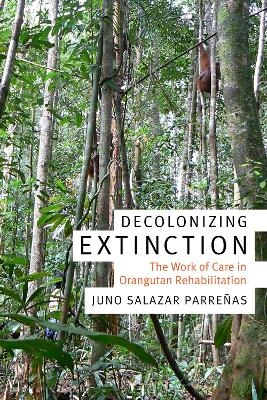
Decolonizing Extinction
The Work of Care in Orangutan Rehabilitation
Seiten
2018
Duke University Press (Verlag)
978-0-8223-7062-8 (ISBN)
Duke University Press (Verlag)
978-0-8223-7062-8 (ISBN)
Juno Salazar Parreñas traces the ways in which colonialism and decolonization shape relations between humans and nonhumans at a Malaysian orangutan rehabilitation center, contending that considering rehabilitation from an orangutan perspective will shift conservation biology from ultimately violent investments in population growth and toward a feminist sense of welfare.
In Decolonizing Extinction Juno Salazar Parreñas ethnographically traces the ways in which colonialism, decolonization, and indigeneity shape relations that form more-than-human worlds at orangutan rehabilitation centers on Borneo. Parreñas tells the interweaving stories of wildlife workers and the centers' endangered animals while demonstrating the inseparability of risk and futurity from orangutan care. Drawing on anthropology, primatology, Southeast Asian history, gender studies, queer theory, and science and technology studies, Parreñas suggests that examining workers’ care for these semi-wild apes can serve as a basis for cultivating mutual but unequal vulnerability in an era of annihilation. Only by considering rehabilitation from perspectives thus far ignored, Parreñas contends, could conservation biology turn away from ultimately violent investments in population growth and embrace a feminist sense of welfare, even if it means experiencing loss and pain.
In Decolonizing Extinction Juno Salazar Parreñas ethnographically traces the ways in which colonialism, decolonization, and indigeneity shape relations that form more-than-human worlds at orangutan rehabilitation centers on Borneo. Parreñas tells the interweaving stories of wildlife workers and the centers' endangered animals while demonstrating the inseparability of risk and futurity from orangutan care. Drawing on anthropology, primatology, Southeast Asian history, gender studies, queer theory, and science and technology studies, Parreñas suggests that examining workers’ care for these semi-wild apes can serve as a basis for cultivating mutual but unequal vulnerability in an era of annihilation. Only by considering rehabilitation from perspectives thus far ignored, Parreñas contends, could conservation biology turn away from ultimately violent investments in population growth and embrace a feminist sense of welfare, even if it means experiencing loss and pain.
Juno Salazar Parreñas is Assistant Professor of Science and Technology Studies & Feminist, Gender, and Sexuality Studies at Cornell University and editor of Gender: Animals.
Acknowledgments ix
Introduction: Decolonizing Extinction 1
Part I. Relations
1. From Ape Motherhood to Tough Love 33
2. On the Surface of Skin and Earth 61
Part II. Enclosures
3. Forced Copulation for Conservation 83
4. Finding a Living 105
Part III. Futures
5. Arrested Autonomy 131
6. Hospice for a Dying Species 157
Conclusion: Living and Dying Together 177
Notes 189
References 223
Index 255
| Erscheinungsdatum | 21.08.2018 |
|---|---|
| Reihe/Serie | Experimental Futures |
| Zusatzinfo | 7 illustrations |
| Verlagsort | North Carolina |
| Sprache | englisch |
| Maße | 152 x 229 mm |
| Gewicht | 544 g |
| Themenwelt | Sachbuch/Ratgeber ► Geschichte / Politik ► Allgemeines / Lexika |
| Sachbuch/Ratgeber ► Natur / Technik ► Naturführer | |
| Geisteswissenschaften ► Geschichte ► Regional- / Ländergeschichte | |
| Naturwissenschaften ► Biologie ► Ökologie / Naturschutz | |
| Naturwissenschaften ► Biologie ► Zoologie | |
| Sozialwissenschaften ► Ethnologie | |
| Sozialwissenschaften ► Soziologie | |
| ISBN-10 | 0-8223-7062-X / 082237062X |
| ISBN-13 | 978-0-8223-7062-8 / 9780822370628 |
| Zustand | Neuware |
| Haben Sie eine Frage zum Produkt? |
Mehr entdecken
aus dem Bereich
aus dem Bereich


